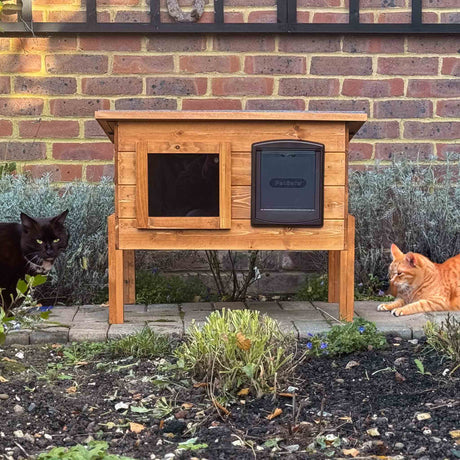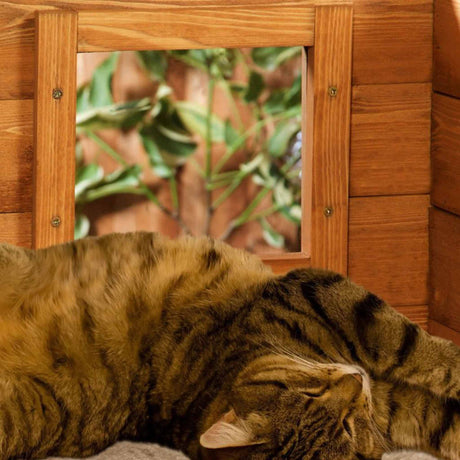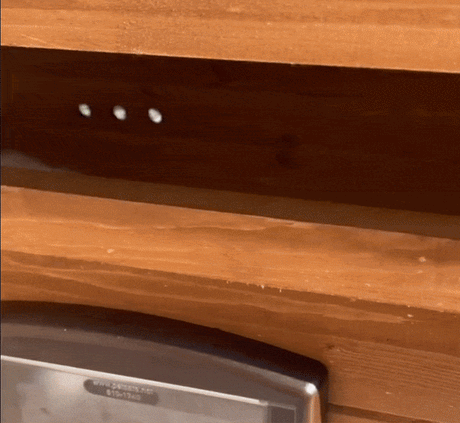This is all well and good, but what happens when a stray pitches up at your front door? Well, you need to consider the Animal Welfare Act 2006 which includes a Duty of Care to animals in your care. This could mean getting the cat urgent veterinary treatment if it's injured, feeding it, and giving it a place to stay until its owners are found.
But how do you find the owner? And what should you do if your search is unsuccessful? Don't stress! We're answering the most frequently asked questions about legal ownership of stray cat/cats in the UK.
Frequently Asked Questions About Stray Cats and What to Do When You Find One
Because cats are often left to wander around on their own, it's pretty much a given that you'll come across a lost or stray cat at some point. Knowing what to do in this situation is key, which is why we're answering the most frequently asked questions we receive with regards to cats, their original owner and the law.
1. What do I do if I have found a stray cat?
First things first. Making sure that the cat is indeed a stray is the first thing you need to do. Check to see if your unexpected visitor is in good condition. Often, a cat that's well-groomed and a healthy weight could very well belong to someone in the neighbourhood, and they're just popping in to say hello.
If the cat is friendly, and happy for you to get close, you should check for a collar or ID tag. If you're able to get the owner's information, give them a call and let them know their pet is safe and make the necessary arrangements for a collection or drop off. In the event there is no collar, you should take the cat to your vet or local Cats Protection branch where they can do a scan for a microchip.
2. Is there a way to locate the owner?
Something else you can do is use a paper collar to establish whether or not the cat has an owner. Even though it's a somewhat simple method in our technological day and age, it's still effective in establishing whether or not the cat has an owner. Simply print the collar, fill in the details and place it around the cat's neck.
3. Are there other ways of finding the owner?
Communication is key. Ask neighbours if they know anything about the cat, or if they recognise it. And if you don't have any joy there, check community groups on Facebook or local groups. There are also a number of websites, like Animal Search that provide a free missing pet search service for lost and found animals.
4. What do I do with the stray in the meantime?

While you're looking for the cat's owners, it's important that you keep it safe with food, water and somewhere warm to stay, If you're unable to bring the cat indoors, you could make use of a feral and stray cat kennel which will provide a warm and safe shelter while you try to locate the owner.
5. Should I make a poster?
It's definitely worth making a poster to advertise the lost or stray cat. Post them around the area and especially in high-traffic areas. Share the poster on Facebook, Twitter as well as websites such as Pets Reunited.
6. What should I do if the cat is injured?
Should you come across a stray or lost cat that is injured, you will need to get it veterinary care as soon as possible. While some organisations offer care and treatment, a lot of them have found themselves under a huge amount of pressure and are unable to assist healthy feral or stray cats.
Having said that, vets have a Duty of Care to treat an injured or sick animal, so we recommend taking the stray to your local vet for the necessary treatment. You can also contact a stray cat rescue organisation in your area.
If the cat is particularly skittish it's best to cover it with a blanket to keep you safe from its claws. If the cat is definitely feral, you might want to trap, neuter and return it.
7. How long before a stray cat is legally yours?
This isn't as straightforward as you'd think. If the cat is microchipped or ID of some kind, it legally belongs to its owners, and they can claim their cat at any time. However, if you've made every attempt to locate the owner without success, you could keep the stray. Keep in mind though, you'll need to be able to provide it with all the necessary care it needs to stay healthy and happy.
8. What should I do if I've found a litter of kittens?

No one can resist a kitten, right? But there are a few things you need to do if you find what appears to be a stray or feral litter.
Check for mum
Most importantly, check to see if the mum is around. This could mean a few hours of undercover work keeping an eye on the kittens. Whatever you do, don't handle the kittens during this time, as it may stop their mum coming back.
Contact a rescue centre
If, after a few hours, there is no sign of mum, you'll need to step in and help. Kittens, especially young ones, are unable to fend for themselves. Get in touch with an animal welfare organisation for help. Depending on where you live, these include the National Animal Welfare Trust, the RSPCA, the Blue Cross or Cats Protection.
Scan mum for a microchip
If you do see mum around, it's a good idea to get her scanned for a microchip. Her owners may very well be nearby and stressing about their missing pet.
Don't keep the litter
As tempting as it might be, keeping the litter of kittens is not a good idea. It's best to get them to a rescue centre where they can be dewormed, vaccinated and spayed or neutered. Once they are ready, they will be rehomed. And at that point, you could certainly consider adopting one yourself.
9. What should I do with a feral cat?

The UK has a large community of feral cats that can't be rehomed, but there are a few things you can do to help if you come across a colony.
Make sure they have food and water
Even though feral cats are capable of taking care of themselves, it's essential that you keep an eye on them during the colder months when food might be a little more scarce. Set up a feeding station and provide them with fresh water.

Give them shelter
As a rule, feral cats aren't particularly comfortable around people or other pets, but that doesn't mean they don't need a warm place to stay when it's cold or raining. If you have feral cats in your area it's worth setting up a shelter where they can keep warm and dry.
Get it veterinary care
If you notice a feral cat with an injury, we recommend getting it the veterinary car it needs. As mentioned before, these cats aren't used to being handled, so it's best to trap it and take it to the vet in a cage. Trying to catch a feral cat could end up with you getting clawed or bitten.
Trap, neuter, return
Although there isn't much you can do about the existing feral cat problem, you can help keep these numbers down by trapping, neutering and returning it. This programme, known as TNR, involves humanely trapping the cat, getting it neutered or spayed and then returning it to its colony. Speak to your local rescue centre to find out if they can assist with this process.
10. How do I keep my cat safe?
Because cats tend to roam, it's worth taking a few precautionary steps to keep yours safe.
Make sure your cat is microchipped
Collars and ID tags are a good idea, but they can be removed or fall off. For this reason, we suggest you get your cat microchipped as soon as possible.
Remember to update your details
If your details are on a pet database it is crucial that you update them regularly. Always provide a mobile number and remember to advise any change of ownership or change of address.
Keep your cat indoors
Even streetwise cats can get lost, which is why we recommend keeping them indoors at night. We also suggest taking extra precautions around fireworks season and bonfire nights.
Don't declaw your cat

Declawing cats is illegal in the UK, however, some cat owners still choose to do this. Not only is this procedure hugely stressful, but it also takes away your cat's ability to climb, and more importantly, defend itself.
Hopefully, we've answered all your questions about stray cats, and what you can do should one cross your path. If you're able to open your home, and heart, to a cat in need, you'll be rewarded in the most wonderful of ways. Of course, we understand if this isn't always possible, but rather than turning a blind eye to the problem, with our handy tips, you can be the solution.









20 comments
Do we have any rights if our cat it the dad of a litter of kittens but the mum is on the streets as we know there out kittens but a random person not even the owner of the other cat who has had the kittens has taken the kittens off the street when we know our cat is the father of the kittens
My partners ex has left him with five cats. They’re chipped in her name and she has all the paperwork. After 18 months of solicitors letters she still has not collected her cats and now he needs to move out of the house too to sell it in the divorce. He found a lovely place for the cats as he can’t afford pay for them anymore and can’t work his usual hours . She’s said no to the people on the phone when they read the chip and contacted her. So we don’t know what to do now
My neighbours neglect their cat. sometimes it is found wandering in the street very late at night. For the past few months it has been coming into my courtyard and eating food I leave for it. On cold nights I make up a bed outside for her to sleep in. For the last four days and nights, she has come inside and stayed. she is very thin and her back seems to be hurt. The skin is not broken. Her fur is thinning on her stomach and around her back and tail. she doesn’t have any whiskers on her face, this is most odd. The neighbour has his daughter, boyfriend, and small child living there. I was wondering if the noise is stressing the cat out, hence the reason why she won’t go home. I have two cats by the way, but they are not bothered about this new one is around.
What should I do?
We already have two female cats but there were two Tom cats at first there was one and he kept coming through the cat flap to eat our two cats food. The more we put down the more he would come in and eat. Then a few nights later there were two toms turned up. The original one and another cat. We put a note on the collar, which she phoned us. The two toms are brothers. She came around to pick them up to take them home, but you could see that they didn’t want to go. Within 24 hours she let them out again and they were straight around to our house again. She didn’t come to pick them up. She wasn’t bothered about them. They had moved in. The only place they were allowed to go when they went home was conservatory.
When ever we spoke to her she would say that she had a nine year old daughter at home crying her eyes out. But she never bothered to contact us to find out if we had them. Then she went out and got a small yappy dog that yapped all the time. Her two cats were terrified of this dog. So they never went home. They would always come back to us. One of the toms wasn’t well at one point so we took him to the vets. The vets got on to her to pick him up and within 24hours he was back with us. It is difficult because they haven’t been home for months now. They are happy here even though we have two female cats who don’t really get on with them but everyone is happy as long as they have their own space. But the problem is they have sprayed everywhere and don’t know how to stop them. I have had two laptop computer screens replaced. All my curtains are stained. It has cost me a fortune, I just want them to stop. My house smells of cats now. They have both been neutered. But they still continued to spray. Any ideas please?